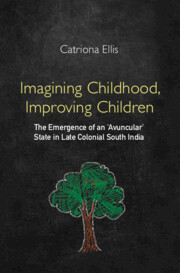 Imagining Childhood, Improving Children
Imagining Childhood, Improving Children Book contents
- Frontmatter
- Dedication
- Contents
- Acknowledgements
- List of Abbreviations
- Introduction
- 1 The Child at School: Compulsory Education in the Madras Presidency
- 2 Educating the Child: The Introduction of Compulsory Education in Madras City
- 3 Imagining the Child as Learner: Progressive Pedagogy in the Madras Presidency
- 4 Producing the Healthy Schoolchild
- 5 Saving the Child: The Madras Children Act, 1920, and the Beginnings of a Juvenile Justice System
- 6 Protecting the Poor Child: The Practical Expansion of Juvenile Justice
- 7 Defining Childhood: Sexual Parameters of Childhood
- 8 Remembering Childhoods: Childhood Memories in Autobiographies
- Conclusion: Children, Childhood and the Growth of the Avuncular State in South India
- Notes
- Bibliography
- Index
4 - Producing the Healthy Schoolchild
Published online by Cambridge University Press: 19 April 2023
- Frontmatter
- Dedication
- Contents
- Acknowledgements
- List of Abbreviations
- Introduction
- 1 The Child at School: Compulsory Education in the Madras Presidency
- 2 Educating the Child: The Introduction of Compulsory Education in Madras City
- 3 Imagining the Child as Learner: Progressive Pedagogy in the Madras Presidency
- 4 Producing the Healthy Schoolchild
- 5 Saving the Child: The Madras Children Act, 1920, and the Beginnings of a Juvenile Justice System
- 6 Protecting the Poor Child: The Practical Expansion of Juvenile Justice
- 7 Defining Childhood: Sexual Parameters of Childhood
- 8 Remembering Childhoods: Childhood Memories in Autobiographies
- Conclusion: Children, Childhood and the Growth of the Avuncular State in South India
- Notes
- Bibliography
- Index
Summary
The intimate link between the body of the child and its intellectual development became a key aspect of the expanding educational concerns within the Madras Presidency in the 1920s and 1930s. The agreement within the Corporation of Madras that ‘if you cannot feed the body of a child you cannot feed the brain’ reflected a radical redefinition of the role of education authorities and a significant change in state welfare provision. This chapter explores the links between health, nutrition and education and the expansion of the authority of the state over the body of the schoolchild, and the implications for the child's position as a future citizen. The introduction of the medical inspection of children allowed policymakers to ‘know’ the child statistically and to chart the health of the school population. This increased knowledge provided the statistical backing for a number of practical interventions, the most notable being the attempt to establish a paediatric hospital and the introduction of a scheme to provide free midday meals for impoverished schoolchildren funded by the Madras City Corporation.
The new interventions in children's health reflect the self-positioning of a modern elite who demonstrated their right and ability to rule through the introduction of progressive and science-based welfare reforms. Attempts to define the child statistically, departmental differences over funding and organisation and political discussions over intervention, all reveal that south Indian policymakers and politicians saw themselves as the state, were prepared to use the new powers granted in the Government of India 1919 Act and actively claimed the authority and responsibility to intervene in the intimate sphere of the family. This was not an overt rejection of colonial practices of governmentality but rather their reformulation within a local context by Indians as they established themselves as modern state actors, often through similar strategies of population control and development that built on earlier colonial practices. The details of the health schemes reveal how this functioned in the local context, in the relationships between provincial and municipal governments, and as the definitions of education and public health were reformulated at discursive and practical levels.
- Type
- Chapter
- Information
- Imagining Childhood, Improving ChildrenThe Emergence of an ‘Avuncular’ State in Late Colonial South India, pp. 98 - 124Publisher: Cambridge University PressPrint publication year: 2023


